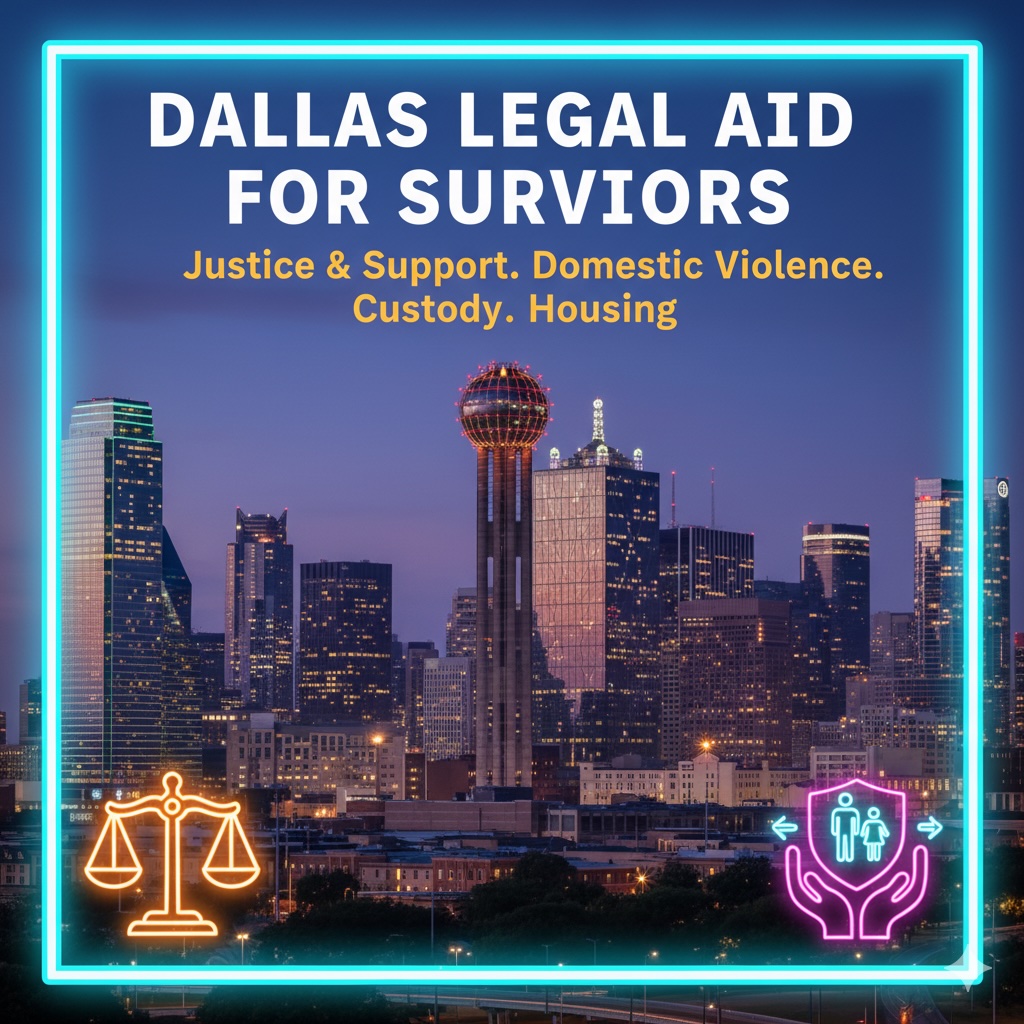Legal Aid and Pro Bono Services for Domestic Violence in Dallas
Explore free and low-cost legal support for survivors of domestic violence in Dallas County. Learn about legal aid organizations, pro bono clinics, protective orders, immigration help, and safe access strategies in Dallas, Texas.

Domestic violence survivors in Dallas often need legal help dealing with protective orders, family law (custody, divorce, support), housing, and immigration relief. Dallas and North Texas have several legal aid and pro bono programs dedicated to helping survivors, regardless of income or status. This resource outlines key providers, what services they offer, and how survivors can access them safely.
Key Legal Aid & Pro Bono Providers in Dallas / North Texas
1. Dallas Volunteer Attorney Program (DVAP)
Website: dallasvolunteerattorneyprogram.org Dallas Volunteer Attorney Program+1
Services:
Free legal clinics (including virtual clinics) offering family law, protective orders, divorce, custody, and related civil matters to low-income residents in Dallas County. Dallas Volunteer Attorney Program+1
Attorneys volunteer to provide full representation or limited advice. Pro Bono Net
Clinics are held weekly (virtual and in-person) and walk-in or by appointment depending on the location. Dallas Volunteer Attorney Program
DVAP is a collaboration between the Dallas Bar Association and Legal Aid of Northwest Texas. Pro Bono Net+1
Eligibility / Notes:
Cannot assist with criminal cases or fee-generating cases (e.g. personal injury). Dallas Volunteer Attorney Program
People need to meet income or resource guidelines; bring proof of income/residency to clinics. Dallas Volunteer Attorney Program
2. Legal Aid of NorthWest Texas (LANWT)
Website: legalaidtx.org Legal Aid of NorthWest Texas
Services:
Provides free civil legal services to low-income individuals across North & West Texas, including Dallas County. Legal Aid of NorthWest Texas
Covers family law matters involving domestic violence, protective orders, custody, divorce, and other civil issues. (Listed as a provider in Justia directory) Justia
LANWT works alongside DVAP for pro bono partnerships. Pro Bono Net+1
3. Dallas Bar Association — LegalLine & Pro Bono Opportunities
Services:
LegalLine: Volunteer attorneys provide free legal advice via phone. The Dallas Bar Association runs a LegalLine on Wednesday evenings. Texas State Library Guides+1
The Bar Association also organizes pro bono opportunities and volunteer matches for attorneys handling family, domestic violence, and immigration cases. dallasbar.org+1
4. Mosaic Family Services (Multicultural Legal Services Program)
Website / Contact: mosaicservices.org Legal Aid of NorthWest Texas+3Dallas County+3Justia+3
Services:
Provides family law, immigration, and domestic violence legal services to survivors, especially in immigrant and multicultural communities. Justia+1
Helps with VAWA, U-visa, custody, divorce, protective orders, and legal support for immigrant survivors. Pro Bono Texas+1
5. Hope’s Door / New Beginning Center (Plano / Collin County, serving Dallas area)
Contact: (972) 422-2911 Justia
Services:
Domestic violence shelter and support agency offering legal referrals, advocacy, and help with protective orders and family law for area survivors. Justia
6. Genesis Women’s Shelter & Support
Contact: (214) 946-4357 Justia+1
Services:
Provides emergency shelter, counseling, safety planning, and connections to legal services for survivors of domestic violence. Dallas County+1
7. Texas Legal Services Center (TLSC)
Website: tlsc.org Wikipedia
Services:
TLSC supports statewide civil legal services, including projects related to victims of domestic violence, sexual assault, and crime victim legal supports. Wikipedia+1
Collaborates with local legal aid providers to fill gaps. Wikipedia
How to Safely Access Legal Help in Dallas
Use a private browser / incognito mode on a device your abuser cannot monitor.
Call from a safe phone line or ask for a callback if direct calling is unsafe.
Ask whether virtual/remote intake is possible to avoid unsafe travel.
Bring (or safely upload) any evidence: police reports, photos, texts, court documents.
After use, clear browser history or phone logs, if safe.
Visit clinics during daylight hours or bring someone you trust, if attending in person.
For court filings, request assistance from DVAP or the courthouse self-help desks.
Frequently Asked Questions (FAQ)
1. Are these legal services free?
Yes. The organizations above generally provide free legal representation or advice for domestic violence and related family law matters for qualifying low-income survivors.
2. What if I don’t live exactly in Dallas proper?
Many programs (like LANWT and DVAP) serve Dallas County and North Texas. You should check each provider’s service area — some suburban or adjacent counties may be covered as well.
3. Can undocumented or immigrant survivors get legal help?
Yes. Programs like Mosaic Family Services and LANWT accept immigrant survivors and assist with immigration-related legal relief (e.g. VAWA, U-visas). Always disclose your status early so the provider can assess eligibility.
4. How quickly can I get a protective order or restraining order?
With legal aid or pro bono help, you may file for a Protective Order same day at court intake. Clinics may help with preparation, filing, and hearings. The speed depends on court backlog, but many DV legal providers prioritize emergency cases.
5. What documents should I bring to my first meeting?
Safe documents include: police or incident reports, photographs, medical or counseling records, texts or messages, witness contacts, ID if you have it, lease or housing papers, any court documents.
6. What if I exceed income limits for legal aid?
Even if you exceed strict eligibility, pro bono programs (DVAP volunteer attorneys, Bar referral services) might still take your case. Also, limited-scope advice or self-help resources may be available.
Conclusion
If you are experiencing domestic violence in Dallas or North Texas, legal help is available. Whether your need is emergency protection orders, help with custody or divorce, or immigration relief, a number of organizations stand ready to support you with safe, confidential, and trauma-informed legal services. You don’t have to face it alone — reach out early, and prioritize your safety.
